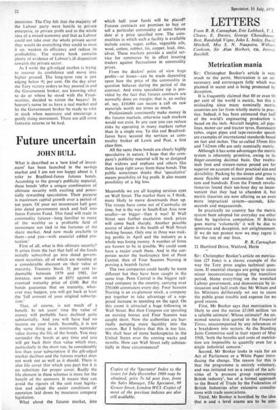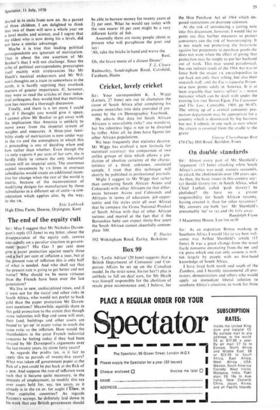LETTERS
From R. B. Carnaghan, Eric Lubbock, T. L. Cleave, E. Davies, George Chowdharay- Best, Randolph Vigne, John L. Insley; David Mitchell, Mrs S. N. Naupoira, William Cookson, Sir Alan Herbert, Ca, Jeremy Burchill.
Metrication mania
Sir: Christopher Booker's article is very much to the point. Metrication is an un- necessary and extravagant folly which was planned in secret and is being promoted by deception.
It is frequently claimed that 80 or even 90 per cent of the world is metric, but this is misleading since many nominally metric countries are far from wholly metric in prac- tice. Indeed, it has been estimated that half of the world's engineering production is based on the inch. Aircraft heights, oil pipe- lines, motor-car and tractor tyres, fluorescent tubes, organ pipes and tape-recoi der speeds are examples of international standards based on feet and inches. The so-called 35mm film and 7.62mm rifle are only nominally metric.
Although it has some advantages the metric system is inherently primitive, owing to its finger-counting decimal basis. Our twelve- inch foot and sixteen-ounce pound are far superior on account of their practical size and divisibility. Packing by the dozen and gross is more flexible and economical than using tens and hundreds. Even the French revolu- tionaries found their ten-hour day so incon- venient that they had to abandon• it, but metric theorists are now offering us an even more impractical system—seconds, kilo- seconds and megaseconds.
In practically no country has the metric system been adopted for everyday use other than by legislative compulsion. If Britain goes metric 'voluntarily' it will be due to ignorance and deception, not enlightenment. If we do not protest now we may regret it for the rest of our lives.
R. B.. Carnaghan 21 Hartford Drive, Watford, Herts
Sir: Christopher Booker's article on metrica- tion (27 June) is a classic example of the way the Tory press angles technical ques- tions. If essential changes are going' to cause minor inconvenience during the transition period, blame everything on the wretched Labour government, and demonstrate by in- sinuation and half-truth that Mr Wilson and his Ministers deliberately set out to cause the public great trouble and expense for no good reason.
First, Mr Booker says that metrication is likely to cost the nation £5,000 million 'on a reliable estimate'. Whose estimate? An un- named source first quoted in the Financial Times, unaccompanied by any references or a breakdown into sectors. As the Standing Joint Committee said in their report of May 1968, 'both the benefits and costs of metrica- tion are impossible to quantify even for a single industrial concern.'
Second, Mr Booker looks in vain for an Act of Parliament or a White Paper intro- ducing the change. The reason for this is that the programme is entirely voluntary, and was initiated not as a result of the acti- vities of 'a pressure group representing British industry', but of a formal approach to the Board of Trade by the Federation of British Industries after extensive consulta- tions with trade associations.
Third, Mr Booker is horrified by the idea that o and A level exams are to be con- ducted in st units from now on. As a parent of three children, I am delighted to think that two of them will save a whole year on o level maths and science, and I regret that my eldest who is now doing his A levels, did not have a similar advantage.
Maybe it is true that leading political correspondents are ignorant of metrication. That is about the one assertion of Mr Booker's that I will not challenge. Since the tribe of political correspondents preoccupies itself mainly with irrelevancies like Mr Heath's nautical endeavours and Mr Wil- son's thoughts on a train to somewhere in the north, it is hardly suprising they overlook matters of greater importance. If, however, they were to read the articles of their indus- trial colleagues, they would find that metricat. tion has received a thorough discussion.
Finally, and there is a lot more I could say if I thought you would give it space, I cannot allow Mr Booker to get away with the implication that America is unlikely to move away from the imperial system of weights and measures. A three-year feasi- bility study of metrication is now under way in the us and the atmosphere in which this is proceeding is one of deciding when and how rather than whether. Even though the us only exports 4 per cent of her GPN, she is hardly likely to remain the only industrial nation still on imperial units. The enormous capital investment by us firms in overseas subsidiaries would create an additional incen- tive for change when the rest of the world is metric, because of the inconvenience of modifying designs for manufacture by those subsidiaries in a different set of units—a con- sideration which applies also, by the way, to the inc.
Eric Lubbock High Elms Farm, Downe, Orpington, Kent































 Previous page
Previous page